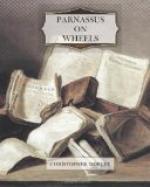And then I did a dishonourable thing. Just by chance I put my hand into the little pocket beside the seat where Mifflin kept a few odds and ends. I meant to have another look at that card of his with the poem on it. And there I found a funny, battered little notebook, evidently forgotten. On the cover was written, in ink, “Thoughts on the Present Discontents.” That title seemed vaguely familiar. I seemed to recall something of the kind from my school days—more than twenty years ago, goodness me! Of course if I had been honourable I wouldn’t have looked into it. But in a kind of quibbling self-justification I recalled that I had bought Parnassus and all it contained, “lock, stock, barrel and bung” as Andrew used to say. And so....
The notebook was full of little jottings, written in pencil in the Professor’s small, precise hand. The words were rubbed and soiled, but plainly legible. I read this:
I don’t suppose Bock or Peg get lonely, but by the bones of Ben Gunn, I do. Seems silly when Herrick and Hans Andersen and Tennyson and Thoreau and a whole wagonload of other good fellows are riding at my back. I can hear them all talking as we trundle along. But books aren’t a substantial world after all, and every now and then we get hungry for some closer, more human relationships. I’ve been totally alone now for eight years—except for Runt, and he might be dead and never say so. This wandering about is fine in its way, but it must come to an end some day. A man needs to put down a root somewhere to be really happy.
What absurd victims of contrary desires we are! If a man is settled in one place he yearns to wander; when he wanders he yearns to have a home. And yet how bestial is content—all the great things in life are done by discontented people.
There are three ingredients in the good life: learning, earning, and yearning. A man should be learning as he goes; and he should be earning bread for himself and others; and he should be yearning, too: yearning to know the unknowable.
What a fine old poem is “The Pulley” by George Herbert! Those Elizabethan fellows knew how to write! They were marred perhaps by their idea that poems must be “witty.” (Remember how Bacon said that reading poets makes one witty? There he gave a clue to the literature of his time.) Their fantastic puns and conceits are rather out of our fashion nowadays. But Lord! the root of the matter was in them! How gallantly, how reverently, they tackle the problems of life!
When God at first made man (says George Herbert) He had a “glass of blessings standing by.” So He pours on man all the blessings in His reservoir: strength, beauty, wisdom, honour, pleasure—and then He refrains from giving him the last of them, which is rest, i.e., contentment. God sees that if man is contented he will never win his way to Him. Let man be restless, so that
“If goodness lead him not, yet weariness
May toss him to My breast.”




